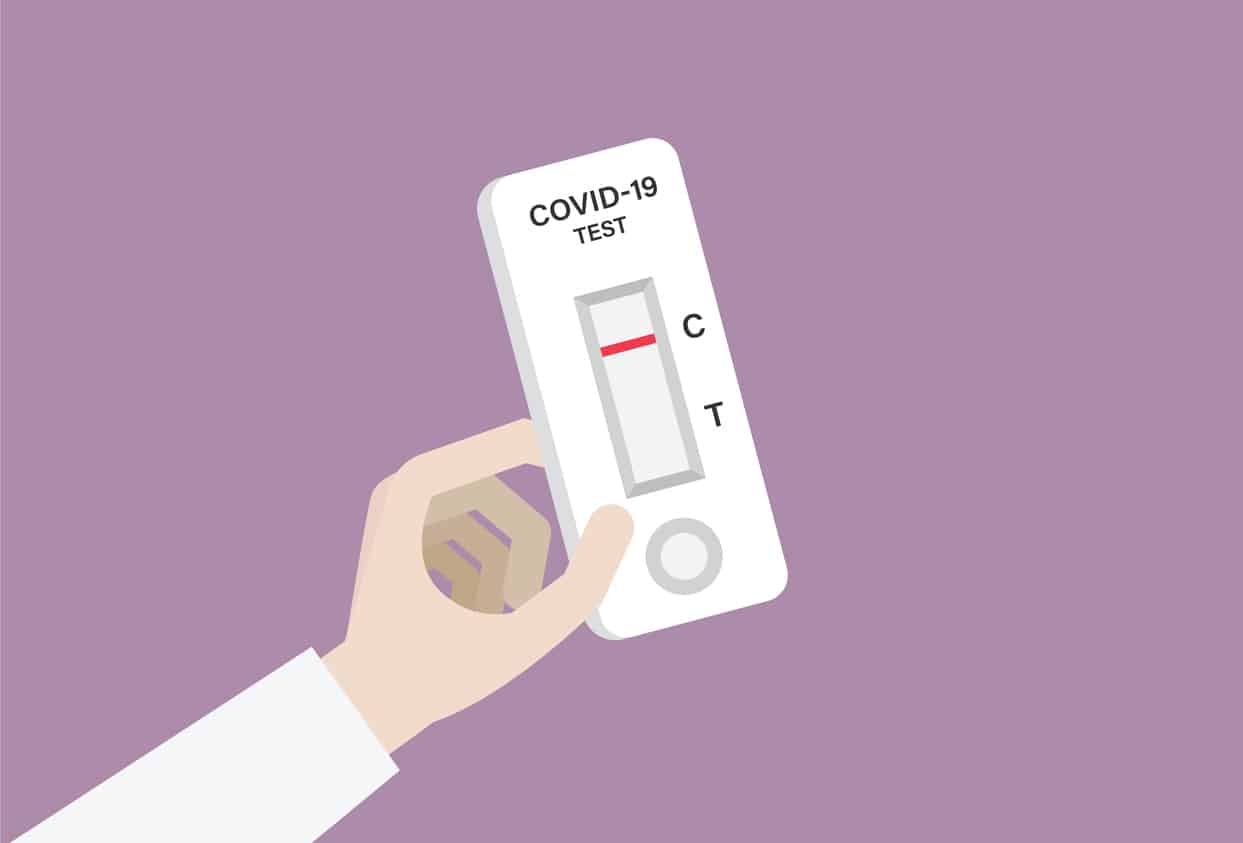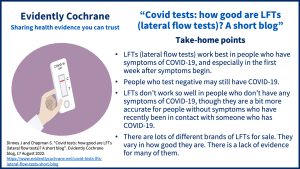Can you rely on the result of your LFT (lateral flow test)? Here’s a brief look at the latest evidence on how well LFTs for COVID-19 work.
This blog is based on a longer blog by Jac Dinnes – COVID tests: how accurate are LFTs
Take-home points
The evidence on LFTs (lateral flow tests) comes from the Cochrane ReviewCochrane Reviews are systematic reviews. In systematic reviews we search for and summarize studies that answer a specific research question (e.g. is paracetamol effective and safe for treating back pain?). The studies are identified, assessed, and summarized by using a systematic and predefined approach. They inform recommendations for healthcare and research. Rapid, point‐of‐care antigen tests for diagnosis of SARS-CoV-2 infection (published July 2022).
Testing for COVID-19 is an important way of helping reduce the spread of infection. For example, if you test positive, you can self-isolate and let people you’ve been in contact with know that they might be at riskA way of expressing the chance of an event taking place, expressed as the number of events divided by the total number of observations or people. It can be stated as ‘the chance of falling were one in four’ (1/4 = 25%). This measure is good no matter the incidence of events i.e. common or infrequent. of having caught the infection.
The use of lateral flow tests or LFTs has become very common during the COVID-19 pandemic. Using swab samples from the inside of the nose or throat, they are easy to do anywhere and give a result in less than half an hour. PCR tests use the same swab samples but need to be done in a laboratory.
But how well do LFTs work?
A team has put together all the available research and put it together, to give us answers from the best available evidence. There is evidence for 49 different brands of LFTs from a large number of studies.
In people with COVID-19 symptoms:
LFTs are good at giving a negative result when people have symptoms but don’t have COVID-19.
In 100 of these people:
- 99 will get the right test result – negative.
- One person will test positive and wrongly think they have COVID-19.
For people who have symptoms and do have COVID-19, testing is best in the first week.
In 100 of these people:
- 81 will get the right test result – positive.
- 19 people will get the wrong result. They’ll test negative and wrongly think they don’t have COVID-19.
In people with COVID-19 who test after the first week of having symptoms, LFTs are less reliable. Just under half of people who do have a Covid infection will test negative and just over half will test positive.
So, when you take the test matters – and affects how much you can trust the result.
In people with no COVID-19 symptoms:
Again, LFTs are good at giving the right result – negative – when people don’t have COVID-19. 99 out of 100 people who don’t have Covid will test negative and just one will test positive.
They’re not nearly so good at giving the right result – positive – when someone has COVID-19 but does not have symptoms. Only 55 out of 100 of these people will test positive, and 45 will think they don’t have COVID-19 when they do. Not much better than flipping a coin!
LFTs do a bit better for people without symptoms who have recently been in contact with someone with COVID-19. Out of 100 of these people, 64 will get a positive LFT result and 36 will get a negative result.
Different brands of LFT vary in how good they are
There are lots of different brands of LFTs for sale. They vary in how good they are. There is a lack of evidence for many of them.
If you’d like to know more, you can read more detail in the longer version of this blog – COVID tests: how accurate are LFTs
Join in the conversation on Twitter with @jacdinnes @CochraneUK and @Cochrane_IDG or leave a comment on the blog. Comments are checked by the Editors before they are made public on the blog.
Please note, we cannot give specific medical advice and do not publish comments that link to individual pages requesting donations or to commercial sites, or appear to endorse commercial products. We welcome diverse views and encourage discussion but we ask that comments are respectful and reserve the right to not publish any we consider offensive. Cochrane UK does not fact check – or endorse – readers’ comments, including any treatments mentioned.
Reference:
Dinnes J, Sharma P, Berhane S, van Wyk SS, Nyaaba N, Domen J, Taylor M, Cunningham J, Davenport C, Dittrich S, Emperador D, Hooft L, Leeflang MMG, McInnes MDF, Spijker R, Verbakel JY, Takwoingi Y, Taylor-Phillips S, Van den Bruel A, Deeks JJ. Rapid, point-of-care antigen tests for diagnosis of SARS-CoV-2 infection. Cochrane Database of Systematic ReviewsIn systematic reviews we search for and summarize studies that answer a specific research question (e.g. is paracetamol effective and safe for treating back pain?). The studies are identified, assessed, and summarized by using a systematic and predefined approach. They inform recommendations for healthcare and research. 2022, Issue 7. Art. No.: CD013705. DOI: 10.1002/14651858.CD013705.pub3.
Declaration of interests:
Dr. Dinnes reports grants from NIHR Birmingham Biomedical Research Centre at the University Hospitals Birmingham NHS Foundation Trust and the University of Birmingham (Grant Reference Number BRC-1215-20009), during the conduct of the studyAn investigation of a healthcare problem. There are different types of studies used to answer research questions, for example randomised controlled trials or observational studies.. Sarah Chapman has nothing to disclose.




[…] amongst healthcare professionals. Cochrane has recently published a review of the available evidence surrounding Covid LFT […]